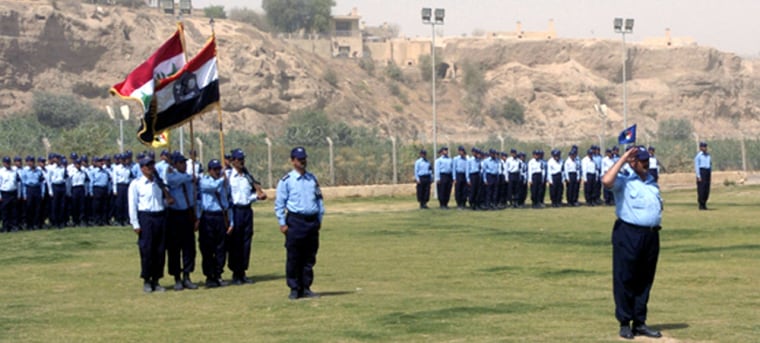Iraq’s nascent police force has suffered from inadequate recruiting and vetting of candidates that has apparently even allowed some insurgents to join up, a U.S. government report said Monday.
Even so, the study — by the inspectors general at the Defense and State Departments — said the effort to build up Iraq’s police agencies has been a qualified success.
The military, in a written response, said it is addressing most of the concerns raised by the study. The investigation concluded in April, and Pentagon officials said many of the proposed changes are already being implemented.
A functioning Iraqi police force, along with the Iraqi military, is regarded as critical to bringing U.S. troops home once they are capable of fighting the insurgency without much American assistance.
One of the report’s key criticisms was that coalition military personnel are not able to properly find and screen candidates for the police force.
“Inducting criminals into the (Iraqi police) is a continual concern. Even more troubling is infiltration by intending terrorists or insurgents. There is sufficient evidence to conclude that such persons indeed are among the ranks of the” Iraqi police, the report said.
The Iraqis are better able to pick recruits than U.S. and allied military personnel, it said. Recruits brought in by the Iraqis in Baghdad are often better suited for the job than those recruited by coalition forces in the rest of the country.
The language skills and cultural knowledge of Iraqis makes them better able to detect potential problem candidates, particularly in the face of poor records that would normally be reviewed during a vetting process, the report suggested.
“Despite recent improvements, too many recruits are marginally literate; some show up for training with criminal records or physical handicaps, and some recruits allegedly are infiltrating insurgents,” the report said.
Iraqi government taking more control
The military responded that many recruiting and vetting functions are being turned over to the Iraqi government, as the report calls for.
The report says Iraqi police performed well during the January elections and are visible on the streets of Iraq. It also cites polls that suggest Iraqis have increasing confidence in the police force.
“Although the IPS is not yet capable of single-handedly meeting the security challenges, relevant Coalition training efforts have resulted in a qualified success,” the report said.
Current plans call for building a police force of about 135,000. But the report criticizes the U.S. administration in Iraq for focusing too much on reaching that number, and not enough on finding quality recruits in the face of a rising insurgency.
“There is a perception that training programs have produced ’cannon fodder’ — numbers of nominal policemen incapable of defending themselves, let alone the Iraqi public,” the report says.
About 1,600 Iraqi police died in the year before the report was prepared, it says. Police and recruiting stations have been targets of suicide bombers.
Only about 30,000 Iraqi police stayed in their jobs after the U.S.-led invasion. The country now has about 93,800 trained and equipped personnel under the command of its interior ministry, including 63,500 Iraqi police. These figures include Iraqi personnel who may have deserted the force.
The rest includes a mix of special operations forces, bodyguards and other security troops.
